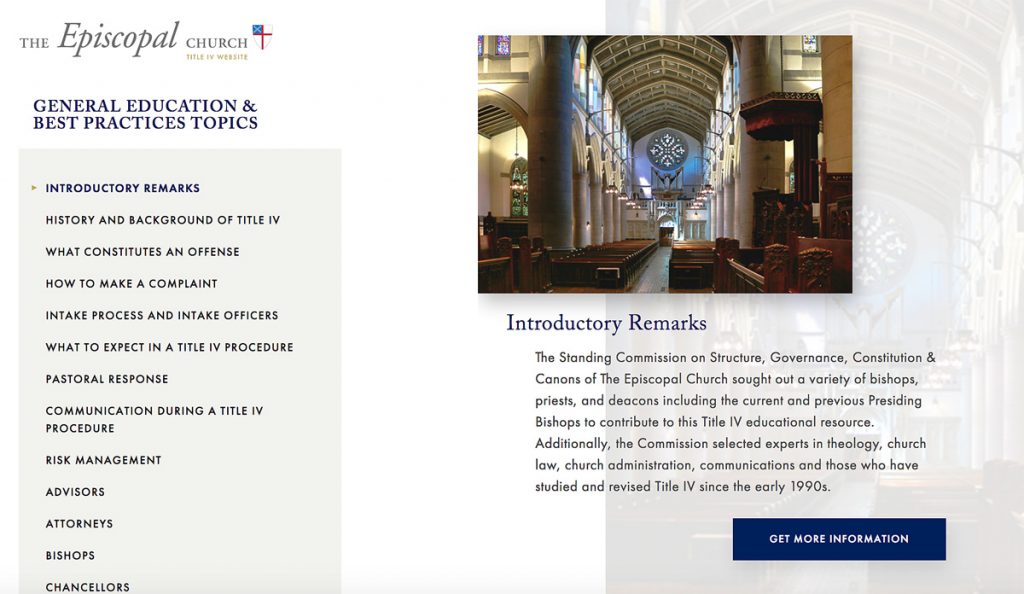The Episcopal News Service reports:
The Episcopal Church’s decades-long process of refining its clergy discipline process will take a big logistical step forward this summer when an interactive website debuts. The site was developed with the hope of bringing a common understanding of the rules and helping clergy avoid getting into trouble and injuring others in the first place.
The website is in the beta testing phase, and members of the church’s Executive Council have been invited to join that process. The site is designed to help Episcopalians navigate the church’s Title IV clergy disciplinary process (those canons can be found beginning on page 131 of the church’s Constitution and Canons here).
Council member Polly Getz, who has long-time experience as a chancellor at various levels of the church, explained to her colleagues April 21 that the website is the result of nearly two years of work by a subcommittee of the Standing Committee on Structure, Governance, Constitution and Canons.
The project drew praise from three of the church’s leaders after it was presented to the council.
Presiding Bishop Michael Curry noted during a news conference after the end of the meeting April 23 that the invitation to the council to give feedback on the website occurred during the same meeting in which he briefed the members on the report of the Commission on Impairment and Leadership.
Both the website and the report and its recommendations address what happens when “people are hurt or wounded,” he said. Each represents “this church’s commitment to be a place where every human child of God is safe, is respected as a child of God made in God’s image and where we can be as sure of that as we can. That’s this church saying to #MeToo: we’re taking that seriously. It is worth putting all this time and energy into this because we’re serious about this.”
House of Deputies President the Rev. Gay Clark Jennings said, “This has become a project of the heart, mind and soul” for Getz and Diocese of Utah Communications Director Craig Wirth, with whom Getz worked.
The website project will “deepen our ability to respond to unfortunate situations in ways that are constructive, positive and help all parties move ahead,” Jennings said.
The website will include 250 short video interviews about experiences and best practices with clergy, current and past presiding bishops and others – “There are also contributions from experts in theology, church law, church administration and communications, as well as from those who have studied and revised Title IV since the early 1990s.”
Wirth said he thinks the site’s other goal of presenting best practices and teaching about clergy discipline issues is perhaps even more important that the process side. A major success for the website in his eyes, he said, would be “preventing Title IV incidents” in the future.
As such, the best practices section includes people offering what Wirth called “very frank discussions” about the pressures, stresses and obligations that come with living an ordained life. Clergy promise in their ordination vows to do their best to live their lives “in accordance with the teachings of Christ,” so that they “may be a wholesome example to all people.”
Getz and Wirth said they hope seminaries and local clergy formation programs especially will make use of those videos so that more and more new clergy will be schooled in the process and aware of how to protect the people they are meant to shepherd. Getz sees the website as offering a flexible way for formation programs to provide students with uniform knowledge about the rules and their intentions.
The entire story can be read at the first link above. Image is from the ENS site.

